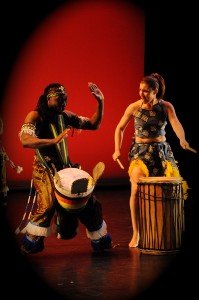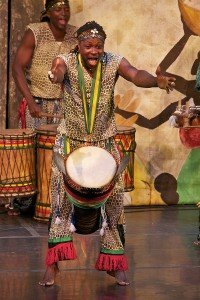It’s not like ballet, where there’s an age limit: African dance is for everybody
By JAN WILLMS
Supporting the African arts, specifically drum and dance, is happening every week in one of the studios at Patrick’s Cabaret, 3010 Minnehaha Ave.
For eight years, Duniya (which means “world” in English) Drum and Dance has been offering dance training and promoting cultural understanding primarily through West African dance. For Whitney McClusky, a co-founder of the organization, the roots of her dance studio began in New York.
 “I grew up in New York, and I grew up dancing,” she noted. “Then I discovered African dance. There was a studio in New York that was just for African drum and dance. It had every style from every country, anything you would want to learn about African drum and dance. I pretty much stopped the rest of my dancing, and just studied that.”
“I grew up in New York, and I grew up dancing,” she noted. “Then I discovered African dance. There was a studio in New York that was just for African drum and dance. It had every style from every country, anything you would want to learn about African drum and dance. I pretty much stopped the rest of my dancing, and just studied that.”
Photo left: Fode Bangoura and Whitney McClusky perform. (Photo submitted)
After several years of study in New York, McClusky moved to Minnesota, arriving in 2000 while in her early 20s. She then went to France to nanny for a year, and she studied African dance in Paris.
“From there I took my first trip to West Africa,” McClusky said. “I went to Senegal and studied dance there for about two months.” She reflected that she had many years of study before starting Duniya.
“When I first moved to Minnesota, there wasn’t a lot happening with African drum and dance,” she stated. “There is a lot more now.”
Originally, McClusky wanted to bring artists to give performances here, and she wanted to bring some of her teachers from New York to present workshops. Then a drummer she knew from the school she attended in New York came to the Twin Cities to do a workshop, and the two reconnected. Fode Bangoura was a master drummer, giving workshops throughout the country.
“I took my first trip to Guinea with him and his family,” McClusky said. “All the men in his family are drummers and dancers.” She said she focuses on dance. “I don’t call myself a drummer by any means, but it’s just something that I have to do.”
Bangoura, who was still living in New York, determined that he would like to do a dance and drumming conference in Minneapolis. So the first annual Fakoly Drum and Dance Project was born in 2007.
“Fakoly is the name of a person who people in Fode’s family can trace their lineage back to,” McClusky explained.
“We organized that together, and then I was getting a lot of people contacting me to provide performances at schools and private events,” McClusky continued. “At first we didn’t do that, and then Fode moved here. So we had a drummer to work with, and that’s when we started our company. And we were also able to offer weekly classes.”
McClusky said the company performs at a lot of universities that have African student associations and celebrate an African night. Duniya has also performed at the Minnesota State Fair for a number of years through the Arts Affair. “That’s a program to bring local performing artists to the state fair,” she noted. “We do pop-up dances at the fair, just appearing in the middle of a crowd and starting to dance.”
She said the performing group from the dance company consists of her, Bangoura’s three children and his brother and another dancer, Cynthia Matthews. Matthews and McClusky have danced together for years.
“Sometimes we bring in other people,” McClusky added. She teaches at the St. Paul Conservatory for Performing Arts, and she occasionally has some of her students there perform.
Community classes are held at Patrick’s Cabaret on Tuesdays and Saturdays, and participants range in age from 5 to over 50. “This kind of dance is not like ballet, where there’s a time limit on it,” she said. “African dance is for everybody.”
McClusky explained that African dance as a whole is very joyous and uplifting. “Every country in Africa has its own style of dance,” she continued. “The Guinean style is very different from other West African countries, and East African dance, Ethiopian and Somali, are also different.
McClusky said that all dances are usually in celebration of something or of certain rituals, serving to bring people together.
She said some people come to the classes to learn more about the culture, and some come for a good workout; most come for both.
 At this point in her career, McClusky can make her living from her dancing. “This has happened fairly recently,” she said. “I used to clean houses to supplement my income, but it was hard on my body to do such a physical job and then dance.”
At this point in her career, McClusky can make her living from her dancing. “This has happened fairly recently,” she said. “I used to clean houses to supplement my income, but it was hard on my body to do such a physical job and then dance.”
Photo right: Master drummer Fode Bangoura. (Photo submitted)
Earning her living through her art can be risky at times, she admitted. “Even though I am grateful to do what I love, I still have to pay the bills. I wind up teaching so much, and that does not always leave enough time for creating. That is a big challenge.”
She said another challenge is trying to figure out what works best for the community classes. She said a core group may come for three years, and others drop in and out.
“The majority of students just drop in. I would love to level out on classes, have beginners and intermediate. But right now there’s a constant flow of people coming through, so we keep the classes open.”
‘McClusky said she finds equal joy in teaching and performing. “I really do love the teaching, sharing something you love with someone else,” she said. “And I also really love performing.”
“Performing used to scare the crap out of me,” she laughed. “But then I started looking at people in the audience and connecting with them.”
The group’s most recent performance was at Experience Minnehaha, an event designed to promote businesses along Minnehaha Ave., which is undergoing construction. McClusky taught several mini-classes on Minnehaha, between 41st and 42nd Streets, on Aug. 22.
For anyone interested in learning more about West African drum and dance, contact the website at www.duniyadrumanddance.org.
Comments
No comments on this item Please log in to comment by clicking here